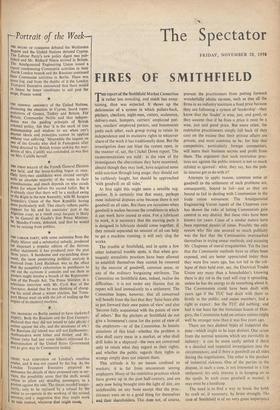- -Portrait of the Week THE HOUSE OF COMMONS debated the
Wolfenden Report and the United Nations debated Cyprus. The Labour Party's new policy digest was pub- lished and Mr. Richard Nixon arrived in Britain. The Amalgamated Engineering Union issued a report condemning Communist activities in their North London branch and the Russians continued their Communist activities in Berlin. There was more fog, and from the depths of it the London Transport Executive announced that there would m future be fewer omnibuses to sail past the stops. France voted.
THE GENERAL ASSEMBLY of the United Nations, discussing the situation in Cyprus, heard repre- sentatives of Greece, Turkey and Britain. For Britain, Commander Noble said that indepen- dence was the guiding principle of British colonial policy, but that 'it is the mark of true statesmanship and wisdom to see when one's dearest ideals and principles cannot be applied without vast suffering.' Meanwhile the inquest on one of the Greeks who died in Famagusta after being detained by British troops seeking the mur- derers of Mrs. Cutliffe was concluded, as was that un Mrs. Cutliffe herself.
THE FIRST BALLOT of the French General Election was held, and the horse-trading began at once. Only forty-two candidates were elected outright with an absolute majority of the votes in their constituencies, and much depends on who stands down for whom before the second ballot. But it is already clear that there will be a marked swing to the Right in the new Assembly, with M. Jacques Soustelle's Union of the New Republic having done particularly well. This clearly reflects public support for his and his associates' part in the Algerian coup; as a result coup Jacques is likely to be General de Gaulle's first Prime Minister. M. Mendes-France, defeated, said that he would not be retiring from politics.
THE LABOUR PARTY, with some assistance from the Daily Mirror and a substantial subsidy, produced (at sixpence) a popular edition of the thirteen Policy statements it has produced over the past three years. A handsome and eye-catching docu- ment, the most penetrating political analysis it received from Lord Hailsham was to the effect that the pamphlet's exhortation to purchascrs to cut out the cartoons it contains and use them as Posters might involve a breach of the Representa- tion of the People Act. The Prime Minister, in a television interview with Mr. Cyril Ray of the Spectator, denied that he was thinking of chang- ing his mind about a winter election, but Trans- Port House went on with the job of tooling up the engine of its electoral machine.
*
THE PRESSURE on Berlin seemed to have slackened slightly. Both the Russians and the East Germans declared that they did not intend to take physic::l action against the city, and the statement of whvt the Russians did intend was still not forthcoming. Ambassadors went hither and thither, and Mr. Nixon (who had just come hither) reiterated the determination of the United States Government not to give way to Communist tactics.
* THERE WAS CONFUSION on London's omnibus routes, and it was not caused by the fog. As the London Transport Executive prepared to announce the_details of their proposed cuts in ser- vices, the possibility arose that the staffs would refuse to allow any standing passengers, as a Protest against the cuts. The threat receded tempo- rarily, only to be replaced by a refusal by the union to co-operate in the working of the revised services, and a suggestion that they might work to rule instead, whatever that might mean,






























































 Previous page
Previous page